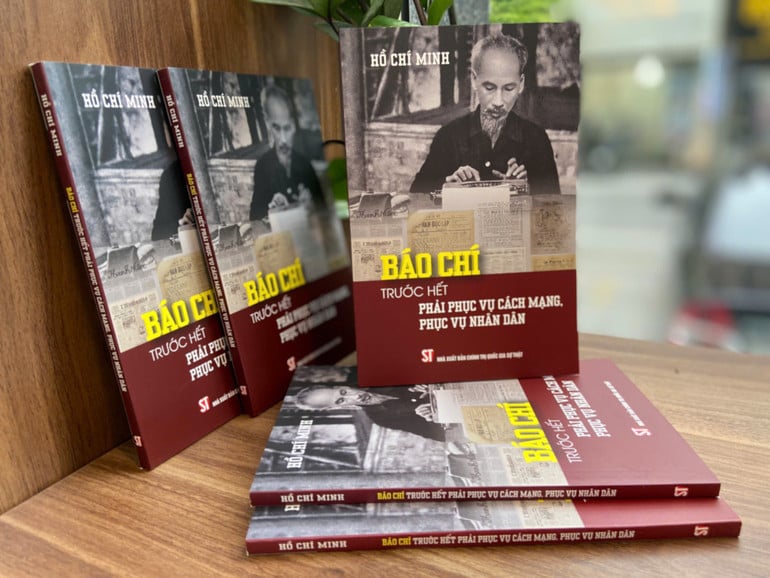The book selects 40 typical works of President Ho Chi Minh , including articles, speeches, letters, telegrams, and appeals sent to readers, journalists, and domestic and international press agencies. These are his important instructions for journalism and journalists, written from 1922 to 1962.
This is a work of profound theoretical and practical value, contributing to affirming his consistent thoughts on the role, responsibility and ethics of the Vietnamese Revolutionary Press.

The book "The press must first serve the revolution and serve the people".
President Ho Chi Minh was not only a national liberation hero and an outstanding cultural figure, but also a great revolutionary journalist, who laid the foundation for the birth of Vietnam's revolutionary press with the publication of Thanh Nien newspaper, the mouthpiece of the Vietnam Revolutionary Youth Association on June 21, 1925 - a milestone in the opening of Vietnam's revolutionary press, with the task of propagating theory, politics and ideology among the people, preparing for the birth of the Communist Party of Vietnam .
Not only founding and leading many newspapers, Nguyen Ai Quoc - Ho Chi Minh also had a "special fate" with journalism. He directly wrote many articles with strong fighting spirit; trained, taught, guided, and oriented journalists and cared about the development of Vietnam's revolutionary journalism.
Regardless of his position, from a novice journalist toPresident - Ho Chi Minh always clearly and consistently affirmed the view: the press must first serve the revolution and serve the people.
This is not only a professional viewpoint, but also a guiding ideology for the entire Vietnamese revolutionary press. It is a press that is not far from reality, not neutral, not standing outside the class struggle and the ideal of national liberation. The press must be a sharp weapon on the ideological and cultural front, the voice of the Party, the State and the working people.
The 40 works selected in the book are short but profound, simple but imbued with the spirit of service, style and art of journalists. He requires journalists to answer three questions before writing an article: Who are you writing for? What is the purpose of writing? and How to write in a way that is easy to understand, easy to remember, and easy to follow.
He criticized formalistic, dogmatic, and stereotyped journalism, and at the same time required journalists to practice writing in a concise, specific, focused, and in-depth style, closely linked to real life. He especially valued the ethics of journalists, requiring them to have revolutionary qualities, be close to the masses, live honestly, modestly, and be responsible for every word they wrote.
The book is not only a research document on Ho Chi Minh's ideology and journalistic style, but also a guideline for journalists in the current period.
In the context of the press facing many changes and challenges such as social networks, fake news, declining public trust, pressure to commercialize information, etc., it is very necessary to return to Ho Chi Minh's ideology and orientation on the press. Because no matter how the press changes its form, genre, or means, the core values of the press remain unchanged: The press serves the Party, serves the people, for the ideal of national independence and socialism.
For today’s journalists, the book is a must-read document. Each work in the book is a lesson in professional ethics, a reminder of responsibility, of the pioneering role, of the meaning of journalism and journalists. It is also a source of inspiration and motivation for the Vietnamese press to continue to innovate and develop on the basis of always steadfastly pursuing the goal of serving the Fatherland and the people.
According to Nhan Dan Newspaper
Source: https://baohoabinh.com.vn/16/202042/Bao-chi-truoc-het-phai-phuc-vu-cach-mang,-phuc-vu-nhan-dan-Tu-tuong-Ho-Chi-Minh-soi-duong-cho-bao-chi-hom-nay.htm




















































![[Maritime News] More than 80% of global container shipping capacity is in the hands of MSC and major shipping alliances](https://vphoto.vietnam.vn/thumb/402x226/vietnam/resource/IMAGE/2025/7/16/6b4d586c984b4cbf8c5680352b9eaeb0)













































Comment (0)